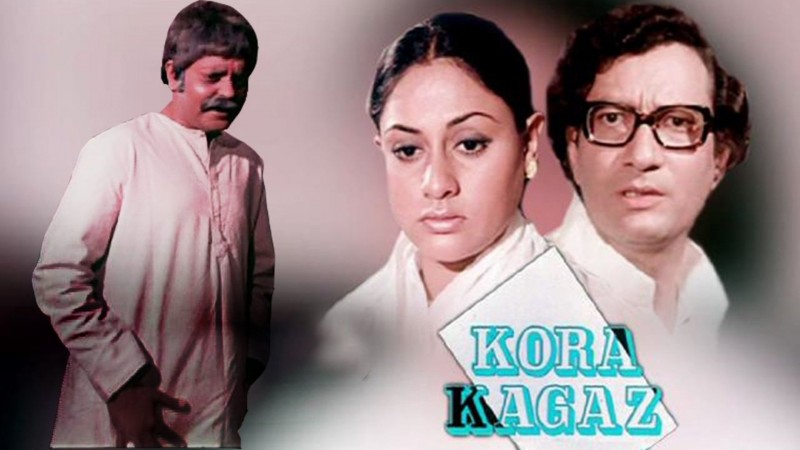
Bollywood classic "Kora Kagaz," which debuted in 1974, made a lasting impression on both its viewers and Indian cinema. The movie, which starred Vijay Anand and Jaya Bhaduri in the lead roles, examined the difficulties of marital relationships and societal expectations. Many people might not be aware that "Kora Kagaz" was based on the Bengali novel "Saat Paake Bandha" by Ashutosh Mukherjee, which had already been transformed into a Bengali movie of the same name in 1963. Suchitra Sen's outstanding performance in the Bengali version made it stand out and brought her the prestigious Best Actress prize at the Moscow International Film Festival. This article explores the development of "Saat Paake Bandha" from a novel to a Bengali film, and then how it became the Hindi blockbuster "Kora Kagaz."
Famous Bengali author Ashutosh Mukherjee wrote the book "Saat Paake Bandha" in 1957. The title's English translation is "Seven Steps Together," which represents the seven vows of marriage. In the context of post-independence India, the novel delves into the complex dynamics of marital relationships while examining themes of love, sacrifice, and social mores. The writing of Mukherjee is renowned for its deep character development and its capacity to capture the subtleties of human emotions.
Ajoy Kar, a director, chose to adapt Ashutosh Mukherjee's well-known book for the big screen in 1963. The title of the movie, "Saat Paake Bandha," was carried over from the novel, and Suchitra Sen and Soumitra Chatterjee played the leading ladies. The way Suchitra Sen portrayed the main character, Archana, was absolutely captivating. She received a lot of praise for her ability to accurately portray the range of emotions felt by her character, which culminated in her winning the Best Actress prize at the Moscow International Film Festival.
The movie faithfully portrayed Mukherjee's story, keeping to the spirit of the original work. It focused on the turbulent journey that married couple Archana and Sukhendu took as they dealt with societal pressures and their own aspirations. As the characters embark on their marital journey together in seven steps, each representing a different aspect of their relationship, the film's significance is made clear throughout.
As a result of its outstanding performances, engrossing narrative, and timeless themes, "Saat Paake Bandha" established itself as a cultural landmark in Bengali cinema. Suchitra Sen's enduring talent was on display, and it further cemented her reputation as one of India's greatest actors.
The larger Indian film industry took note of "Saat Paake Bandha's" success. A pan-Indian audience could relate to the story's universal themes, which Bollywood recognised as a possibility given its propensity for adapting regional classics. Director Anil Ganguly started the process of adapting the Bengali masterpiece into the Hindi movie "Kora Kagaz" in 1974.
While adapting the plot and characters for the Hindi-speaking audience, "Kora Kagaz" kept the essential elements. The role of Archana, the female lead, was cast with Jaya Bhaduri, who was already well-known for her excellent acting abilities. As Sukhendu, Vijay Anand acted. The characters received new life on screen thanks to their on-screen chemistry and nuanced performances, which stayed true to the core of the original story.
The title of the movie, "Kora Kagaz," which translates to "Blank Paper," alludes to the possibility of adding experiences, emotions, and experiences to the life and relationships' blank canvases. Archana's journey as a wife and mother, her sacrifices, and her ultimate search for self-identity are central to the story. It expertly illustrates the difficulties faced by women in a patriarchal society as well as the value of individuality and personal aspirations.
The song "Kora Kagaz" resonated with audiences all over India. Its examination of marital issues, societal pressures, and personal development struck a chord with viewers from all walks of life. With classic songs like "Mera Jeevan Kora Kagaz" and "Roop Tera Mastana," the film's melodic music, composed by Kalyanji-Anandji, added to its appeal.
Critical acclaim for Jaya Bhaduri's portrayal of Archana helped her win numerous awards and solidify her position as a star in Bollywood. The movie also touched on important social issues, promoting dialogue about women's suffrage and individuality in marriage.
The transformation of "Saat Paake Bandha" into "Kora Kagaz" exemplified how storytelling has the ability to cut across geographical boundaries. It is evidence of the enduring power of human emotions and the universality of literary themes. Newer generations are discovering and appreciating the movie's timeless story, which contributes to its lasting legacy.
The progression of "Saat Paake Bandha" from Ashutosh Mukherjee's Bengali novel to the Bengali film adaptation, and ultimately to the Bollywood blockbuster "Kora Kagaz," is a testament to the power of storytelling and the capacity of cinema to cross cultural divides. For Jaya Bhaduri's outstanding performance in the Hindi remake, Suchitra Sen's legendary Bengali performance from the original version served as a foundation. The themes of exploring the difficulties of marriage, societal expectations, and personal identity run throughout both films despite their roots in distinct cultural contexts.
"Kora Kagaz" is a timeless classic that never fails to mesmerise viewers with its moving narrative and unforgettable performances. It serves as a reminder that despite the passage of time, the concepts of love, self-discovery, and sacrifice are still relevant today.
The Evolution of a Classic Kora Kagaz into Chalte Chalte
Rishi Kapoor's Surprising Transformation: From Romantic Hero to Villain in 'Kal Kissne Dekha'
'Flash Forward' and Its Transformation into 'Action Replayy'